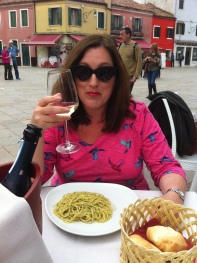 When I noticed the hype about Graeme Armstong’s debut, The Young Team, on Twitter I was intrigued on several levels.
When I noticed the hype about Graeme Armstong’s debut, The Young Team, on Twitter I was intrigued on several levels.
Firstly, as I write contemporary Scottish fiction featuring working class voices in local dialect, I was really interested in Graeme’s writing which uses Lanarkshire vernacular and I’ve blogged about dialect several times in the past.
Also, his novel is set in Airdrie, the same setting as, Sisters in Solidarity, the last novel I wrote but haven’t managed to find a publisher for, yet. AndThe Young Team it’s a coming of age story too, like my own debut, Talk of the Toun, which also explores the same themes of identity, belonging and defying the expectations of your social class.
 So, when I saw that Graeme was appearing at the Aye Write book festival (little did I realise at the time that the opening night of the festival would also be the closing night due to coronavirus) in Glasgow it’s fair to say I’d high hopes for this event – nae pressure!
So, when I saw that Graeme was appearing at the Aye Write book festival (little did I realise at the time that the opening night of the festival would also be the closing night due to coronavirus) in Glasgow it’s fair to say I’d high hopes for this event – nae pressure!
I’m glad to report that although it turned out be the only Aye Write event that I’d attend this year, it was excellent as Graeme is very articulate and entertaining. The extract he read out had me hooked and I could imagine Kevin Bridges reading the audio book version.
Graeme has had great media coverage and the fact that the book is inspired by his own experience of gang culture ensures a juicy personal back story and adds authenticity to the narrative. In interviews, Graeme has acknowledged the influence of Trainspotting on shaping his literary ambitions and after reading The Young Team I think it’s a fair comparison. The cast of characters are as memorable as Renton, Franco, Spud and Sick Boy and just as Irvine Welsh used east coast dialect to bring them to life, Graeme has used Lanarkshire dialect for the voice of Azzy.
I found Graeme’s use of dialect interesting. For example, in my writing, I use ‘Ah’ instead of ‘I’ whereas Graeme uses ‘A’ which I found made the flow a wee bit confusing at times. Dialect varies from area to area, but it also relates to age group. I live only 15 miles from Airdrie, and I use ‘auld’ for ‘old’ but Graeme’s characters describe, almost everything, as ‘eld’, not a phrase used by me or my middle-aged characters. Also, the controversial ‘c’ word is littered across every page. This might offend some readers but it’s important to note that it’s often used by Azzy and his gang as a term of endearment, something which seems very much a Scottish trait in certain social groups.
I tend not to read in-depth reviews until I’ve finished a book, some of them give away too much detail and I want to avoid spoilers. After reading and very much enjoying The Young Team I looked up a few reviews online. Most of the media coverage indicated that Graeme’s novel was destined to be a success and that the Scottish literary scene now has a vibrant personality to champion underrepresented characters. I agree! There still isn’t enough diversity demonstrated in publishing.
The book is rich in Scottish banter and one-liners. “Broonie’s skin is armour-plated thick, tough-made n borne oot ae struggle. Survival expert since the age ae five. Bear Grylls doesnae huv a fuckin look in”. There are also some very good descriptive passages.
The most critical review I read was by Stuart Kelly in The Scotsman, “It is a strange concept, since it cuts both ways. On one hand it is a form of “poverty tourism”, where the higher classes indulge, at a distance, in descriptions of the ways of the lower classes. But it is also a genuine kind of nostalgia, where those who have broken out of a cycle of their designated station still feel a tug back towards their ain kind. The Young Team seems to exemplify this paradox. It is a novel which I feel many people will make their minds up over on scanning the first page, and some will be enthralled and some will be nauseated.
The irony is that the readers who might buy this are not the kind of people who might appear in it, and those whom it describes and anatomises and worries over, most likely will not buy it.”
The demographic of book festivals and many of the book buying public doesn’t mirror Azzy’s world, but I feel there is so much scope for Graeme to reach an audience of young males who are not engaged with reading or education. I warmed to Azzy and willed him not to press the self-destruct button. I can relate to his character on a personal level and so I would love this book to be used in schools as an example of hope and redemption when there seems no way out. Anyone working with young people, particularly males and especially in areas of deprivation, needs to read this book to understand and empathise with those living like Azzy and his pals.














